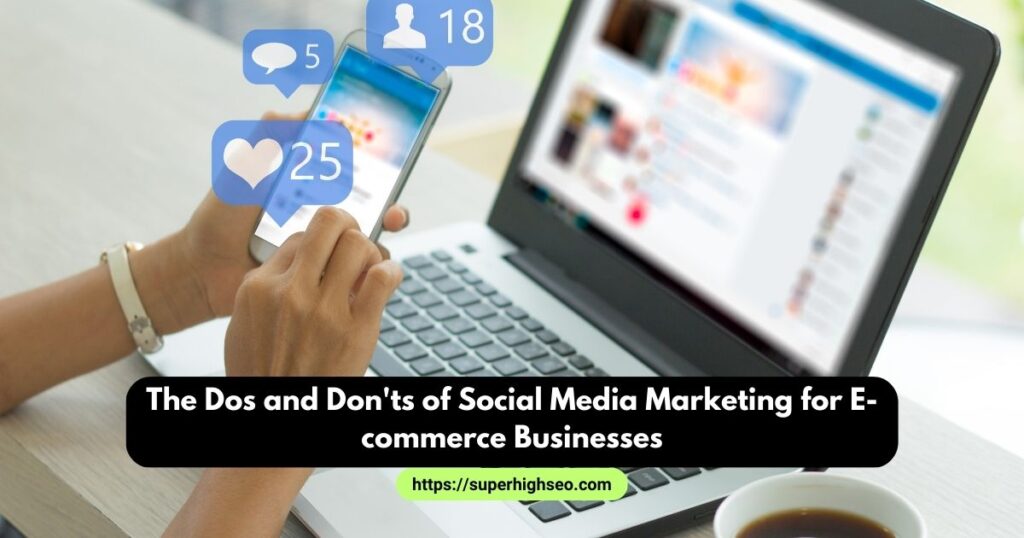
Social media has become an essential tool for businesses to reach their target audience, engage with them, and drive sales. E-commerce businesses, in particular, rely heavily on social media to promote their products and services. However, there are certain dos and don’ts that e-commerce businesses need to keep in mind when using social media for marketing purposes. In this article, we will discuss the dos and don’ts of social media marketing for e-commerce businesses.
Dos:
- Define your target audience: The first step in any social media marketing strategy is to define your target audience. You need to know who you are targeting with your marketing efforts so that you can create content that resonates with them. Define the age, gender, location, interests, and behavior of your target audience.
- Choose the right social media platform: Not all social media platforms are created equal, and each platform has its unique audience and features. For instance, Facebook is ideal for B2C businesses, while LinkedIn is better suited for B2B businesses. Choose the platform that aligns with your target audience and business goals.
- Create a content calendar: Consistency is key when it comes to social media marketing. Create a content calendar that outlines the type of content you will be posting, the frequency of posts, and the platform you will be posting on. This will help you stay organized and ensure that you are posting content that aligns with your business goals.
- Use high-quality visuals: Visuals are a crucial part of social media marketing. Use high-quality visuals, such as product images and videos, to showcase your products and services. This will help your audience visualize your products and make informed purchase decisions.
- Engage with your audience: Social media is a two-way communication channel. Engage with your audience by responding to comments, messages, and reviews. This will help you build a relationship with your audience and increase brand loyalty.
- Use social media advertising: Social media advertising can help you reach a wider audience and drive more sales. Use social media advertising to promote your products and services to your target audience. Social media advertising is cost-effective and can provide a high ROI.
- Monitor your performance: Monitor your social media performance regularly to track your progress and make informed decisions. Use social media analytics to measure your performance and identify areas for improvement.
Don’ts:
- Spam your audience: Spamming your audience with irrelevant or repetitive content can lead to unfollows and a negative reputation. Make sure your content is relevant and adds value to your audience.
- Ignore negative comments: Ignoring negative comments can harm your reputation and customer loyalty. Respond to negative comments promptly and professionally to address the issue and show that you care about your customers.
- Over-promote your products: Over-promoting your products can come across as pushy and salesy, leading to a decrease in engagement and sales. Instead, focus on providing value to your audience by sharing informative and entertaining content.
- Buy followers: Buying followers may seem like a quick way to increase your following, but it can harm your reputation and engagement rates. Focus on building a genuine following by providing value to your audience.
- Use too many hashtags: Using too many hashtags can come across as spammy and decrease the effectiveness of your posts. Use relevant hashtags sparingly and strategically to improve your post’s visibility.
- Post at the wrong time: Posting at the wrong time can lead to lower engagement rates and reduced visibility. Research your audience’s behavior to determine the best time to post.
- Copy competitors: Copying your competitors’ social media strategy can harm your brand’s reputation and make you look unoriginal. Instead, focus on creating a unique and authentic brand identity.
Conclusion:
Social media can be a powerful tool for e-commerce businesses when used effectively, allowing them to reach and engage with their target audience, promote their products and services, and drive sales. By following the dos and don’ts of social media marketing, e-commerce businesses can build a strong online presence and establish themselves as a reputable and trustworthy brand.
Check out these plugins
If You Are Looking Rank Math SEO Pro Plugin Click Here
If You Are Looking Elementor Pro Plugin Click Here
If You Are Looking Wp Form Pro Plugin Click Here
Free WordPress Premium Plugins
Free WordPress Premium Plugins
